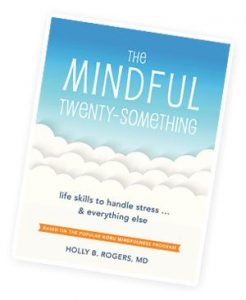
Ashok said, “I can’t meditate. My mind is too busy, too full of thoughts. No matter what I do, they just won’t stop.”
Ashok’s challenge is universal. But the source of his frustration is not exactly what he thinks it is. His difficulty is not that his mind won’t stop. His difficulty is that he thinks it should.
Frustration is the result of wanting or expecting something that isn’t happening. And your mind “stopping” is not going to happen if you are alive and awake.
Your mind is a rushing river of thought. Sometimes it crashes along, all white water and giant waves. Sometimes it slows down a bit. But it never stops.
When we practice mindfulness meditation, we are practicing climbing out of the middle of the river, and settling onto the bank, where we can watch the river flow. No matter how fast the river is moving, you can climb out. Of course it is harder to climb out of a rushing river than a calm river, so we have to be patient and kind to ourselves as we practice pulling ourselves back onto the bank.
Watching the river flow, simply means just noticing what kinds of thoughts are crashing around in your head, and trying not to judge or control them. We lean into kindness and curiosity, over and over.
To climb out of the river, we anchor our awareness on a physical sensation, usually the breath. Feel the breath move in, and feel it move back out. If watching the breath doesn’t work for you, try listening to sounds or noticing a physical sensation like the breeze on your skin.
When you lose track of your breath because all of a sudden you are thinking about something else, that means you are back in the river. It’s not a problem. It is just what minds do.
When you notice that you have lost track of your breath, that moment of noticing means you are back on the bank!
What is important for Ashok, and for all of us, is to be kind and curious about our busy minds. It’s okay if our mind is busy. It’s okay if we are distracted by the pull of our thoughts. It’s not a problem. You have taken a moment to feel your breath and notice what is on your mind. And that is truly wonderful.

Superb analogy – thank you!
Very inspirational posting.
Very asserted ! Thank you for help me get out to the bank!